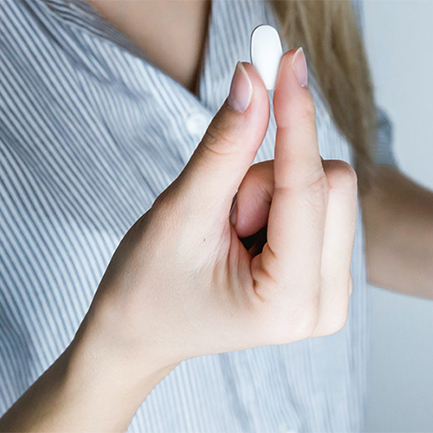Isotretinoin (Accutane)
Why should I try Accutane? I heard it has bad side effects.
If your acne is creating scarring or not responding to an appropriate treatment plan after 3-6 months, Dr. Contestable may offer you isotretinoin. Isotretinoin is very effective for acne, but it is not without side effects. Unfortunately, there is a great deal of mis-information surrounding this very important treatment for acne.
The benefit of Isotretinoin almost always outweighs the risks. Dr. Contestable has treated thousands of patients with isotretinoin, safely and very effectively.
If you have acne that is severe, scarring, or has notresponded to consistent use of other medications you may be a great candidate for Isotretinoin. If you haven’t started because of concerns about side effects or other things you have heard about the medication, please see me so we can discuss your concerns.

So, what side effects can actually happen?
The most common side effects in order are: Dry lips, dry skin, dry eyes, muscle/joint pains, and rash.
The most important side effect are birth defects. This can occur if you become pregnant while on this medication. For this reason, patients with childbearing potential must use two forms of birth control.
Other side effects of the medication include (but are not limited to): elevated liver enzymes (rare), elevated triglyceride levels (uncommon), hair loss (very rare), changes in mood (rare), and headaches (rare). Baseline blood work must be done prior to starting the medication and continue during the treatment course (typically only 3 times – before starting, and after the first two months on treatment).
How can I prevent or treat these side effects?
Isotretinoin slows down oil production in the skin so it is important to moisturize the skin with products like Cetaphil, Skinceuticals Triple Lipid, or Cerave Cream. Your lips will inevitably become dry and scaly – Dr. Contestable recommends using Vaseline, Aquaphor, or Dr. Dan’s Cortibalm throughout the day. Nosebleeds can also occur. You can decrease the chance of nose bleeds by applying Vaseline or Aquaphor to the inside of the nose at night time. For dry eyes, over the counter rewetting drops can provide relief. If you have any decreased vision or need application of rewetting drops more than 4 times per day please let your dermatologist know.
Consider switching to more gentle washes such as – Cetaphil Gentle Skin Cleanser or Cerave Hydrating Cream-to-Foam Cleanser. For those who wear make-up – consider a make-up removing oil or balm such as – Dermatologica Pre-

cleanse oil or cleansing balms by Beauty counter or Colleen Rothschild.
Cetaphil Gentle Skin Cleanser or Cerave Hydrating Cream-to-Foam Cleanser. For those who wear make-up – consider a make-up removing oil or balm such as – Dermatologica Pre-cleanse oil or cleansing balms by Beauty counter or Colleen Rothschild.
Isotretinoin can increase triglycerides, the fats in your blood. Maintain a healthy diet while on the medication, which includes fruits, vegetables, lean proteins, and whole grains and avoid foods high in saturated fats and fried foods. Drink plenty of water. Taking fish oil – 1 gram twice daily can help reduce triglycerides and even some of the side effects of Isotretinoin. Do not start any supplement without speaking with a physician first.
What is a typical Isotretinoin treatment course like?
Prescriptions for isotretinoin are regulated by the FDA through a system called iPledge. Patients must register with iPledge, get routine labs, and be seen monthly while on isotretinoin. A treatment course takes between 6-10 months.
The most important thing to know is you should not become pregnant. Other important things to note: Do not - share medication, donate blood, get any elective procedures or surgeries performed, including body piercing, tattoos, and waxing. Some antibiotics are contraindicated while on isotretinoin. If antibiotics are required for an infection, please speak with your healthcare provider.
Source: American Academy of Dermatology (https://www.aad.org/public/diseases/acne/derm-treat/isotretinoin)
Video from a dermatologist about Accutane - https://www.youtube.com/watch?v=kGL77TPrJOU
Video on low-dose course in a female - https://www.youtube.com/watch?v=bSraZFoZlHs
Video from black female (discussion of hyperpigmentation) - https://www.youtube.com/watch?v=ur03nTljxmk
For Physicians only (or patients of Dr. Contestable) - “Accutane – Females”, “Accutane – Males"
FAQs and answers about Isotretinoin:
At first your acne may worsen a bit (not all patients). Some will begin seeing benefit in the first month (fast responders). Most will take about 3-4 months to see good benefit.
Some will see some very mild improvement in acne scars but this treatment is not designed to treat existing acne scars – but a treatment like this is very important to prevent new ones.
Yes, you can! Typically done more carefully though.
Most patients will have acne that is improved to the point where they only need minimal care to keep them nearly acne free. Many times, re-starting medicated washes or creams that once were ineffective will be all that is needed to maintain great skin. In a lucky few, medicated creams may not be needed at all. If you follow the directions of Dr. Contestable, less than 15% will need Isotretinoin again in the future – using the latest evidenced based medicine (based on research).
Speak with your dermatologist. Side effects of Isotretinoin are dose dependent – sometimes a decrease in dose or holding a dose can help improve symptoms. Again, speak with your dermatologist before making any changes.
This symptom is very dose-dependent (the higher the dose the more likely the symptom). A decrease in dose may be warranted – speak with your dermatologist. You can also speak with your primary care physician, many times the joint pain is related to old injuries or overuse and other therapies can help.
Dr. Contestable typically recommends all patients try to complete 6 months of Isotretinoin treatment. However, the primary goal is to help a patient become completely acne-free (no red bumps) for at least 30 days. For those willing, completing to 60 days acne free may increase the likelihood of acne cure.

